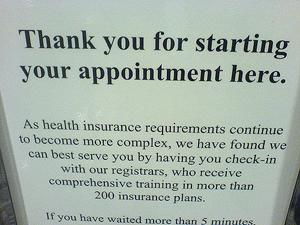Health insurance industry joins reform debate
The following is a partial transcript; for full story, listen to audio.
In the high-volume debate about heath care reform, one major player has been notably quiet: the health insurance industry. For the most part, the industry has given faint support to reform, but that changed this week.
Health insurance companies are buying up ad time in a number of key states as part of a coordinated push to make sure their concerns remain part of the reform debate.
This seems to be good timing as the Senate Finance Committee finally approved its version of health care reform legislation on Tuesday.
Recently, on “The Takeaway,” industry insiders tackled some tough questions about health insurance practices and shared their view of the current reform efforts.
Brad Fluegel, executive vice president and chief strategy and external affairs officer for the health insurer WellPoint, says there are parts of the Senate Finance Committee bill that are “unworkable.”
Fluegel believes certain components in the bill will increase the cost of health insurance for Americans. “Some of those include new taxes being applied on various parts of the health care industry, like insurance companies, pharmaceutical manufacturers, and medical device manufacturers. There’s also significant cuts that are going to be made to the Medicare program — those costs will shift onto those who have private insurance.”
According to Fluegel, insurance premiums are rising because medical costs are rising; not because insurance companies are trying to make a profit. “Health insurance profits account for less than one cent of the US’ health care dollars. The reason that premiums are going up is that health care costs are going up, driven by prices from physicians and hospitals, new medical technologies, new drugs and the like. And those health insurance premiums are increasing because of those factors and not because of profits for health insurance companies.”
America’s Health Insurance Plans (AHIP), a trade group for insurance companies, released a report stating that health insurance premiums are going to rise precipitously higher with the recently passed reform bill.
Senator John Kerry (D-Mass.) had some harsh words for the report at Tuesday’s Finance Committee Hearing: “The insurance industry ought to be ashamed of this report. The fact is, the Pricewaterhouse analysis is significantly flawed, and the results are simply not valid. It is a disgrace …”
Robert Zirkelbach, spokesperson for AHIP defends the report. “All of those reforms are going to have a significant impact on the affordability of health care coverage.”
Jon Gruber, a health care economist at MIT who helped Massachusetts develop its universal health insurance plan, analyzed data from the Congressional Budget Office’s estimates on the reform proposals.
“The Congressional Budget Office said that under the reforms passed by the Senate Finance Committee, the cost of buying a policy in the exchange will actually be lower than it is today in a non-group market.”
A statement from PricewaterhouseCooper said that they did not estimate the impact of subsidies on the net insurance cost to households, and if other provisions in the health care reform bill are successful in lowering costs over the long-term, those improvements would offset the higher costs that they estimated.
“The Takeaway” is a national morning news program, delivering the news and analysis you need to catch up, start your day, and prepare for what’s ahead. The show is a co-production of WNYC and PRI, in editorial collaboration with the BBC, The New York Times Radio, and WGBH.
We want to hear your feedback so we can keep improving our website, theworld.org. Please fill out this quick survey and let us know your thoughts (your answers will be anonymous). Thanks for your time!
